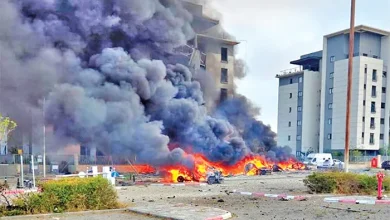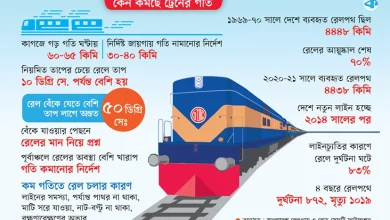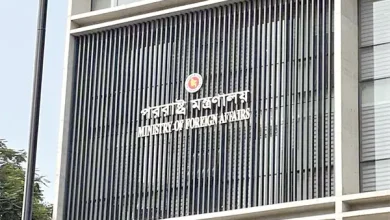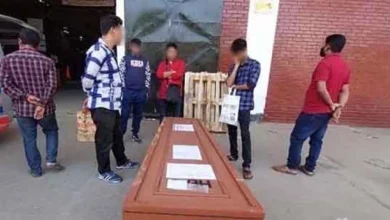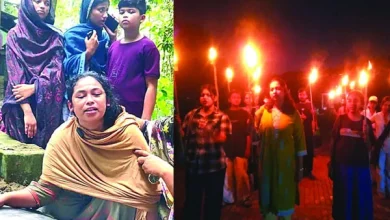JS polls on 7 Jan, CEC announces; urges all parties to join
Earlier this November, the CEC made clear that it did not have a mandate to resolve the crisis between political parties given the limited time in hand ahead of the 12th parliamentary election.

Chief Election Commissioner Kazi Habibul Awal
- Election: 7 January, 2024
- Last date of nomination submission: 30 November
- Nomination scrutiny: 1-4 December
- Appeals: 6-15 December
- Last date of nomination withdrawal: 17 December
- Allotment of symbols: 18 December
- Campaigning: 18 December to 5 January
The Election Commission has declared that the 12th Parliamentary Election will be held on 7 January, amid staunch objections from the opposition parties, including the BNP and the Jamaat-e-Islami.
Claiming that there is an environment of holding free, fair and participatory polls, Chief Election Commissioner Kazi Habibul Awal, invited all parties to participate in the polls during a live telecast from the Nirbachan Bhaban.
He also announced that political parties will be able to submit nominations for candidacies till 30 November.
The Election Commission will scrutinise the submissions from 1-4 December. Appeals against the nominations can be submitted from 6-5 December and nominations need to be withdrawn by 17 December.
The CEC also said political parties will be able to distribute symbols within 18 December and the election campaign will officially kick off on 18 December. The last day of the campaign will be 5 January.
Awal, who spoke amid a thick blanket of security shrouding the country, made the declaration despite opposition parties insisting that a consensus was yet to be reached regarding the form of government that would be in place during the elections.
Earlier this November, the CEC made clear that it did not have a mandate to resolve the crisis between political parties given the limited time in hand ahead of the 12th parliamentary election.
Under the constitution, the national election must be held within 90 days before the five-year term of the current parliament expires.
The BNP and Jamaat-e-Islami have both said they would not go for elections unless it is under a caretaker government.
Even before the announcement, the Islami Andolon Bangladesh had said it would lay siege to the EC premises as it did not support a “one-sided election.”
In view of the objections, major areas and cities of the country were covered in security through the deployment of police, Rapid Action Battalion (RAB) and the Border Guards Bangladesh (BGB).
Business leaders on Tuesday (14 November) also urged the FBCCI to meet the BNP and AL to urge them not to hold programmes that could hurt the economy, already under strain of a decade high in food inflation reaching 12.56% in October.
The contentions haven’t only come nationally.
Prior to the EC telecast, US Ambassador Peter Haas had handed out letters sent by US Assistant Secretary of State for South and Central Asian Affairs Donald Lu – calling for “dialogue without preconditions” – among the AL, the BNP and the Jatiya Party.
Similar calls have emerged from the UK and even top rights bodies, such as the United Nations.
On 31 October, ruling out the possibility of a dialogue with the BNP, Prime Minister Sheikh Hasina said she would do so only if the United States President Joe Biden did the same with former US president and 2024 presidential candidate Donald Trump.
Reacting to Donald Lu’s letter, Awami League General Secretary and Minister of Road Transport and Bridges Obaidul Quader earlier today also rejected the possibility of engaging in dialogue with opposition parties to resolve the ongoing political deadlock.
Although the impasse has been bubbling beneath the surface for years, it came to a head following a rally called by the BNP on 28 October to push home its demand for elections to be held under a caretaker government.
The rally was suspended midway by BNP Secretary General Mirza Fakhrul, who also announced a hartal for the next day.
On the next day, Fakhrul was arrested by police.
This was followed by arrests of other BNP leaders, including Amir Khosru and Moazzem Hussain.
The BNP hartal and the subsequent blockades it announced in the following days were joined by the Jamaat-e-Islami and other parties, who held similar demands.
Even on the day of the election schedule announcement, the BNP, Jamaat-e-Islami and some other parties have been observing the fifth phase of their blockade.
In the past, heavy political objections to election schedules haven’t been pretty.
Blood polls’ day dot history
In 2018, the EC announced 23 December as polls’ day.
It would go on to be one of the deadliest election days in recent history, leaving 18 people dead, media reports said.
The voter turnout was said to be 80%.
For the 10th national polls in 2014, the EC took 30 days since the countdown began to announce the schedule.
The day of polls – with a 22% turnout amid a boycott by the major opposition BNP – was again tainted with blood as it saw 18 deaths, according to media reports.
Electoral code of conduct comes into effect
With the announcement of the polls schedule, the electoral code of conduct has taken immediate effect.
The EC is likely to issue directives today, asking all aspiring candidates to remove their posters, placards, banners and billboards from public places.
The commission may give a timeframe to complete the task.
No one can start electioneering until the last date for withdrawal of candidacy.
Ministers and lawmakers cannot use government vehicles or enjoy facilities for carrying out election-related work. They are also not allowed to make any donations to any institution from public funds.
Besides, the government cannot approve or inaugurate any development project at this time.

